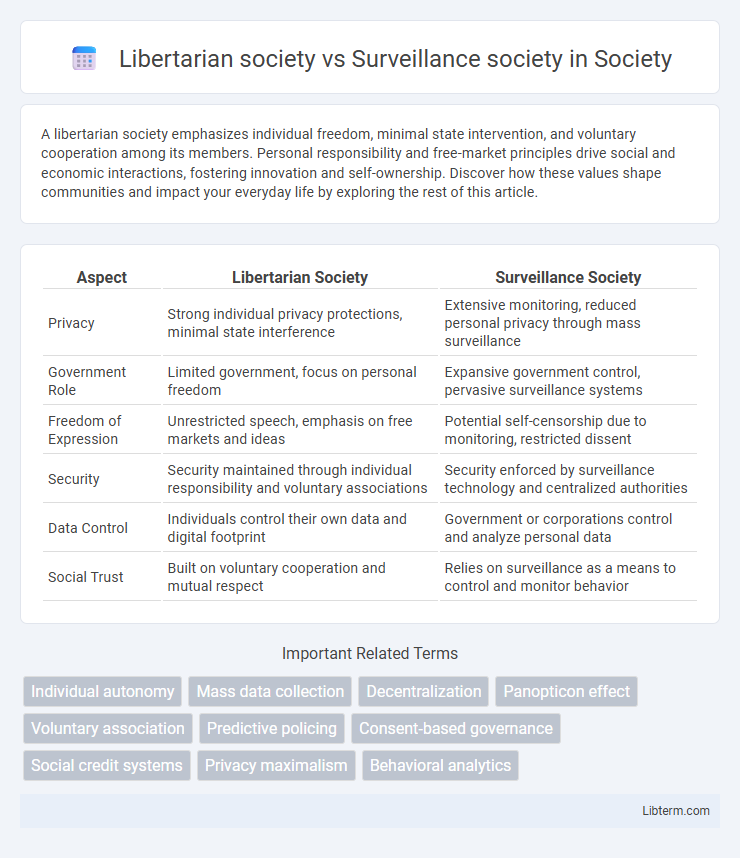A libertarian society emphasizes individual freedom, minimal state intervention, and voluntary cooperation among its members. Personal responsibility and free-market principles drive social and economic interactions, fostering innovation and self-ownership. Discover how these values shape communities and impact your everyday life by exploring the rest of this article.
Table of Comparison
| Aspect | Libertarian Society | Surveillance Society |
|---|---|---|
| Privacy | Strong individual privacy protections, minimal state interference | Extensive monitoring, reduced personal privacy through mass surveillance |
| Government Role | Limited government, focus on personal freedom | Expansive government control, pervasive surveillance systems |
| Freedom of Expression | Unrestricted speech, emphasis on free markets and ideas | Potential self-censorship due to monitoring, restricted dissent |
| Security | Security maintained through individual responsibility and voluntary associations | Security enforced by surveillance technology and centralized authorities |
| Data Control | Individuals control their own data and digital footprint | Government or corporations control and analyze personal data |
| Social Trust | Built on voluntary cooperation and mutual respect | Relies on surveillance as a means to control and monitor behavior |
Defining Libertarian Society
A libertarian society emphasizes individual freedom, minimal government intervention, and the protection of personal privacy and property rights. It prioritizes voluntary interactions and personal responsibility over centralized control or surveillance. The core principle is that individuals have the autonomy to live their lives without unwarranted monitoring or restrictions imposed by the state.
Core Principles of Surveillance Society
Surveillance society centers on pervasive monitoring through technologies such as CCTV, biometric data collection, and digital tracking, prioritizing security and control over individual privacy. Core principles include state or corporate oversight, data aggregation for predictive analytics, and limited transparency regarding data use. These mechanisms often lead to diminished personal freedoms, contrasting sharply with libertarian values of minimal state intervention and maximal personal autonomy.
Individual Freedom in Libertarian Societies
Libertarian societies prioritize individual freedom by minimizing government intervention and protecting civil liberties such as privacy, free speech, and personal autonomy. In contrast, surveillance societies compromise these freedoms through extensive monitoring and data collection, justified by security or social order concerns. The balance between security and liberty heavily favors personal rights in libertarian models, emphasizing voluntary association and limited state control.
Privacy Concerns in Surveillance Societies
Surveillance societies prioritize state or corporate monitoring, often sacrificing individual privacy to enhance security and control. The extensive collection of personal data, including location, communications, and biometric information, raises significant privacy concerns and risks of abuse or unauthorized access. In contrast, libertarian societies emphasize minimal government intervention and robust privacy protections, advocating for citizens' rights to control their personal information without pervasive surveillance.
Government Roles: Minimalism vs. Oversight
In a libertarian society, government roles emphasize minimalism, prioritizing individual freedoms and limited intervention in personal and economic affairs. Conversely, a surveillance society enforces extensive government oversight, utilizing pervasive monitoring to maintain security and regulate behavior. The balance between minimal government interference and comprehensive surveillance reflects fundamentally contrasting approaches to governance and civil liberties.
Impact on Civil Liberties
A libertarian society prioritizes individual freedoms, ensuring minimal government intrusion and strong protection of civil liberties such as privacy, free speech, and personal autonomy. In contrast, a surveillance society often compromises these liberties by implementing extensive monitoring systems that can lead to censorship, reduced freedom of expression, and erosion of privacy rights. The balance between security and liberty in surveillance societies frequently results in weakened civil protections, raising concerns about government overreach and loss of personal freedoms.
Technology’s Influence on Societal Structure
In a libertarian society, technology empowers individuals by maximizing privacy, decentralizing control, and enhancing personal freedoms through encrypted communication and blockchain platforms. Conversely, a surveillance society leverages advanced technologies like facial recognition, mass data collection, and AI-driven analytics to centralize power, monitor behavior, and restrict civil liberties. The contrasting technological infrastructures shape societal structures by either fostering autonomy and innovation or enforcing control and conformity.
Social Trust and Accountability
Libertarian societies emphasize minimal government intervention, fostering high social trust through individual autonomy and voluntary accountability mechanisms. Surveillance societies rely on extensive monitoring to enforce accountability, often undermining social trust by creating environments of suspicion and compliance driven by external control. The balance between personal freedom and institutional oversight significantly impacts the level of trust and collective responsibility within a community.
Security vs. Personal Autonomy
Libertarian societies prioritize personal autonomy by limiting government surveillance and championing individual privacy rights, believing that security measures should not infringe on personal freedoms. Surveillance societies emphasize extensive monitoring and data collection, arguing that increased security through state oversight is essential to prevent crime and maintain public order. The tension between these models centers on balancing the need for security with the preservation of civil liberties and individual autonomy.
Future Prospects: Balancing Freedom and Surveillance
Future prospects of a libertarian society emphasize safeguarding individual freedoms and privacy through decentralized technologies and minimal state intervention. In contrast, a surveillance society prioritizes security and control, leveraging advanced data analytics and ubiquitous monitoring to predict and prevent risks. Achieving balance requires integrating transparent governance frameworks and privacy-preserving innovations to mitigate authoritarian overreach while enhancing collective safety.
Libertarian society Infographic

 libterm.com
libterm.com